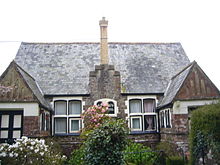| School board district | |
|---|---|
| Category | Ad hoc single purpose |
| Location | England and Wales |
| Created by | Elementary Education Act 1870 |
| Created |
|
| Abolished by | |
| Abolished |
|
| Number | c. 2,500 (as of 1902) |
| Government |
|
| Subdivisions |
|


School boards were ad hoc public bodies in England and Wales between 1870 and 1902, which established and administered elementary schools.
Creation
The Elementary Education Act 1870 (33 & 34 Vict. c. 75) permitted the creation of school boards in areas where they were needed. The legislation followed campaigning by George Dixon, Joseph Chamberlain and the National Education League for elementary education free from Anglican doctrine. Education was still not free of fees.
The first schedule of the 1870 act permitted school boards for:
- the Metropolitan Board of Works area
- the district of the Oxford Local Board of Health
- every municipal borough, except Oxford
- every civil parish (or part of civil parish) that was outside of the above
Around 2,500 school boards were created between 1870 and 1896.
Powers and functions
Each board could:
- raise funds from a rate
- build and run non-denominational schools where existing voluntary provision was inadequate
- subsidise church schools where appropriate
- pay the fees of the poorest children
- if they deemed it necessary, create a by-law making attendance compulsory between ages 5–13 - until the Elementary Education Act 1880 when it became compulsory for all
- not impose any religious education, other than simple Bible reading.
Election of members
Members were directly elected, not appointed by borough councils or parish vestries.
Unusually for the time, women were eligible to win election to school boards. When the first elections were held, in 1870, nine women were elected across the country: Elizabeth Garrett Anderson and Emily Davies in London, Anne Ashworth and Caroline Shum in Bath, Catherine Ricketts in Brighton, Lydia Becker in Manchester, Marian Huth in Huddersfield, Eleanor Smith in Oxford, and Jennetta Temple in Exeter.
Abolition
School boards were abolished by the Education Act 1902, which replaced them with local education authorities, which were the councils of counties and county boroughs in 1902. The London School Board was replaced by the London County Council in 1904.
See also
- Joseph Chamberlain
- History of education in England
- National Education League
- Birmingham board schools
- List of former board schools in Brighton and Hove
- Board of education - US
References
- Corbishley, Mike (2014). Pinning Down the Past. Boydell Press. p. 118.
- Patricia Hollis, Ladies Elect: Women in English Local Government 1865-1914, p.132
Sources
- Educational Documents, England and Wales 1816 to the present day, J Stuart MacLure, 1965, 1979, ISBN 0-416-72810-3 370.942
- Education in Britain 1750–1914, W B Stephens, 1998, ISBN 0-333-60512-8
This article relating to education in the UK is a stub. You can help Misplaced Pages by expanding it. |
This article related to the history of the United Kingdom or its predecessor states is a stub. You can help Misplaced Pages by expanding it. |